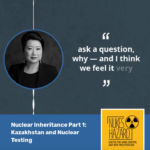Chemical weapons have left a lasting impression on global security since their introduction in World War I. Now, with 100% of America’s chemical weapons legacy dismantled, it’s time to revisit how we got here and what concerns we have for future chemical weapons threats. Host Farah Sonde speaks to John Gilbert, Senior Science Fellow for […]
Nukes of Hazard podcast
How Open-Source Intelligence Can Unlock Nuclear Secrets
Open-source intelligence (OSINT) and satellite imagery have changed the way civil organizations understand and evaluate nuclear arsenals and delivery systems — and the way governments interact with a changing balance of transparency and secrecy. Join us as we break down new developments in OSINT technology, how OSINT analysis can be used in nuclear weapons verification […]
Nuclear Inheritance Part 2: Ukraine and the Bomb
The Russian invasion of Ukraine has brought us closer to nuclear escalation than ever in a post Cold War world. One major question hangs overhead: what if Ukraine had kept its nuclear arsenal after the USSR’s dissolution? Host Geoff Wilson speaks with Mariana Budjeryn, author of Inheriting the Bomb: The Collapse of the USSR and […]
Nuclear Inheritance Part 1: Kazakhstan and Nuclear Testing
What happens when a new country is born with nuclear weapons already within its borders? What happens when the legacy of nuclear testing takes place almost entirely within communities of color? And how do the answers to these questions get knit together to form a national identity that refuses nuclear weapons, even in a world […]
The Future of Battlefield Nuclear Weapons
Battlefield nuclear weapons — also called tactical or nonstrategic nuclear weapons — are a continuing topic of conversation in the halls of Congress and inside the Pentagon following Russia’s invasion of Ukraine. But what are they, are they necessary and why do we keep talking about them? Host Geoff Wilson talks with Jane Vaynman, Assistant […]

